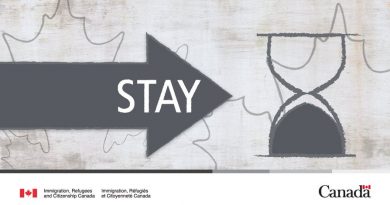- managing and controlling a percentage of equity in a qualifying business
Or when applying to immigrate as an investor to describe:
- at least two one-year periods of experience in the period from five years before the application date to the day a decision is made on the application.
Experience must have to do with:
- managing and controlling a percentage of equity in a qualifying business; or
- experience managing at least 5 full-time job equivalents per year in a business; or
- a combination of one year managing and controlling a percentage of equity in a qualifying business and one year of experience managing at least 5 full-time job equivalents in a business.
Business visitor
Related term:
Business traveller
A person who:
- comes to Canada to take part in international business or trade activities,
- has no intent to enter the Canadian labour market, and
- works for and is paid by a company outside Canada or by a foreign government.
Canadian business
An organization that:
- is incorporated under Canadian or provincial law and has an ongoing operation in Canada, or
- has an ongoing operation in Canada that can generate revenue, is run for profit, and has a majority of voting or ownership interests held by Canadian citizens, permanent residents or Canadian businesses, or
- was created by the laws of Canada or a province.
Canadian citizen
A person described as a citizen under the Citizenship Act. This means a person who:
- is Canadian by birth (either born in Canada or born outside Canada to a Canadian citizen who was themselves either born in Canada or granted citizenship) or
- has applied for a grant of citizenship and has received Canadian citizenship(naturalization).
Canadian Experience Class
An immigration category that allows foreign workers or recently graduated international students working in Canada to apply for permanent residence.
Canadian Language Benchmarks (CLB)
The Canadian standard used to describe, measure and recognize English language ability of adult immigrants and prospective immigrants who plan to live and work in Canada, or apply for citizenship. The Niveaux de compétence linguistique canadiens (NCLC) is used to assess abilities in the French language.
Case Processing Centre (CPC)
A CIC office in Canada that receives citizenship and immigration applications. There are CPCs in Sydney (Nova Scotia), Mississauga (Ontario) and Vegreville (Alberta). They are not open to the public.
CEGEP
In Quebec, an educational institution that offers pre-university classes (two years) taken between secondary school and university, or technical career programs (three years) that prepare students to enter the job market.
Centralized Intake Office
A CIC office in Sydney, Nova Scotia. This office receives applications from several permanent immigration programs, like federal skilled workers and immigrant investors.Office staff check applications to make sure they are complete. They then forward them to the visa office responsible for the applicants’ home country to be processed.
Certificat d’acceptation du Québec (CAQ)
Related term:
Certificate of acceptance
A document from Quebec’s Ministère de l’Immigration, de la Diversité et de l’Inclusion (MIDI) that:
- a temporary worker must apply for the CAQ with MIDI before coming to Quebec to work, or
- a foreign student must apply for the CAQ with MIDI before coming to study in Quebec.
Certificate of Canadian citizenship
Related terms:
Citizenship certificate
Proof of citizenship
Citizenship card
A Canadian citizenship certificate is a document that proves that a person is a Canadian citizen.The citizenship certificate is an 8½ x 11 paper size certificate that contains:
- your certificate number
- your Unique Client Identifier
- your name
- your date of birth
- your gender
- your effective date of Canadian citizenship
Before February 1, 2012, CIC issued plastic wallet sized citizenship cards as proof of citizenship. These cards came with commemorative certificates. The commemorative certificates cannot be used as proof of citizenship.
Certificate of nomination
Related term:
Nomination certificate
A certificate issued by a province or territory that recommends a foreign national for permanent residence under the Provincial Nominee Program.
Certificate of renunciation
Related term:
Renunciation certificate
A document issued by the Government of Canada that confirms someone is no longer a citizen of Canada because they have willingly given up their Canadian citizenship.
Certification
A formal document that recognizes a person’s skills, knowledge and abilities.
Certified English or French translations
To have a copy certified, an authorized person must compare the original document to the photocopy and must print the following on the photocopy:
- “I certify that this is a true copy of the original document”
- the name of the original document
- the date of the certification
- his or her name
- his or her official position or title and
- his or her signature
Certified photocopy
A photocopy of an original document. It must be readable and certified as a true copy of the original by an authorized person. The person compares the documents and marks on the photocopy:
- their name and signature
- their position or title
- the name of the original document
- the date they certified the document
- the phrase “I certify that this is a true copy of the original document.”
Certified translator
A member in good standing of a provincial or territorial organization of translators and interpreters in Canada.
Citizen
To be a citizen of a country means that a person was either born in that country (in most cases) or has been granted citizenship by that country.
Citizenship
State-recognized nationality and the duties, rights, responsibilities and privileges that come with it.
Citizenship ceremony
Related terms:
Clerk of the ceremony
Presiding officer
The final step in becoming a Canadian citizen. During the citizenship ceremony, candidates for citizenship aged 14 and over must take the oath of citizenship. After taking the oath, new citizens receive their citizenship certificate.See Oath of citizenship, Citizenship judge.
Citizenship Commission
The administrative body that consists of all citizenship judges working across Canada.
Citizenship hearing
An interview with a citizenship judge to assess whether an applicant meets the requirements for a grant of citizenship.
Citizenship judge
An independent, quasi-judicial decision maker who makes legal decisions on residency requirements for some adult citizenship applications, administers the oath of Canadian citizenship, and presides over citizenship ceremonies.See Citizenship ceremony, Oath of citizenship.
Citizenship officer
Related term:
Clerk of the ceremony
A person who is authorized by the Minister under the Citizenship Act to perform the duties of a citizenship officer prescribed by the Citizenship Regulations such as:
- reviewing applications to see whether a person meets the requirements for Canadian citizenship and conducting interviews and hearings with applicants as necessary,
- planning interviews, tests, hearings and citizenship ceremonies,
- granting citizenship to applicants, and
- providing written decision of refusal to applicants including reasons for the refusal.
Citizenship test
A test that applicants aged 18 to 54 must pass to in order to meet the knowledge requirement for Canadian citizenship. The test is usually written, but is sometimes taken orally with a citizenship officer. The test assesses:
- knowledge of Canada, and
- knowledge of the responsibilities and privileges of citizenship.
Client Identification Number
A Client Identification Number (Client ID), also referred to as a Unique Client Identifier Number (UCI), can be found on any official document issued by a Citizenship and Immigration Canada office, Case Processing Centre or a Canadian visa office outside Canada.A Client ID consists of four numbers, a hyphen (-) and four (4) more numbers (example: 0000-0000).A person who has never dealt with Citizenship and Immigration Canada before will not have a Client Identification Number.
College
Related terms:
Community college
Collège d’enseignement général et professionnel (CEGEP) in Quebec
A stage of higher education that comes after high school. Colleges offer one- to three-year diploma programs in academic or technical subjects.
Commitment certificate
A certificate of commitment issued to an applicant by a designated private sector business, confirming their agreement.
Common-law partner
Related term:
Common-law spouse
A person who has been living with another person in a conjugal relationship for at least one year. The term refers to opposite-sex and same-sex relationships.See the legal definition of common-law partner.
An organization that sponsors refugees but has not signed a formal agreement withCIC. A community sponsor would normally sponsor fewer refugees than a Sponsorship Agreement Holder (SAH).
Competency
A measurable skill or set of skills, level of knowledge, and behavioural practices obtained through formal, non-formal or informal learning.
Confirmation of permanent residence number (IMM 5292 or 5509)
You will find this number in top right corner of your Confirmation of Permanent Residence document issued to you by a Citizenship and Immigration Canada office or by the visa office where you submitted your application. Your Confirmation of Permanent Residence number starts with a “T” followed by nine numbers. (Example: T100000000).
Conjugal partner
A person outside Canada who has had a binding relationship with a sponsor for at least one year but could not live with their partner. The term refers to both opposite-sex and same-sex relationships.
Constituent group
Related term:
Sponsorship agreement holder (SAH)
A group authorized in writing by a sponsorship agreement holder (SAH) to sponsor refugees under the SAH’s sponsorship agreement. An example of a Constituent Group is a local congregation or chapter of a national church or organization that is aSAH.
Consulate
Related term:
Mission
A Government of Canada office, located in a major city other than a national capital, which provides services to Canadian citizens abroad. It may or may not provide immigration services.See Visa office, High commission, Embassy.
Contact information
A person’s name, mailing address, telephone number, e-mail address and fax number, if any.See the legal definition of contact information.
Convention refugee
A person who is outside of their home country or country where they normally live and fears returning to that country because of a well-founded fear of persecution for reasons of race, religion, nationality, membership in a particular social group or political opinion.
Conviction
A conviction occurs when a person is found guilty of an offence by a court of law or a tribunal.
Co-op/Internship Work Permit
Foreign students who wish to participate in a co-op or internship program in a Canadian institution must apply for a work permit as well as a study permit. To be eligible for the co-op/internship work permit program, you must meet the following conditions:
- You must have a valid study permit or apply for the work permit in conjunction with a study permit.
- Your intended employment must be an essential and integral part of your program of study in Canada.
- Your employment must be certified as part of your academic program, by a letter from a responsible academic official of the institution.
- Your co-op or internship employment cannot form more than 50 percent of the total program of study.
A person or organization that partners with a private sponsor to share in the delivery of settlement assistance and support to privately sponsored refugees. Co-sponsors can be family members of the sponsored refugee living in Canada.
Country of citizenship
A country of which a person is a citizen. A person may be a citizen of more than one country.
Country of nationality
Your country of nationality is your country of citizenship.See Country of citizenship.
Country of residence
The country a person is living in. A person’s country of residence may be different from their country or countries of citizenship.
Cours de langue pour les immigrants au Canada (CLIC)
Free French language training programs for adult newcomers to Canada. They are funded by the federal government and delivered by school boards, colleges and local organizations that provide services to newcomers.
Credential assessment service
A provincially-mandated organization, such as a regulatory body or a post-secondary institution, that is responsible for assessing the portability of foreign credentials.In Canada, provincial and territorial governments are responsible for assessing and recognizing credentials.
Criminal inadmissibility
When a person is not allowed to enter or stay in Canada because they have committed or been convicted of a crime for which they have not received a record suspension (formerly known as a pardon) or been rehabilitated under the Immigration and Refugee Protection Act. The crime could have been committed and/or the conviction rendered in or outside Canada. See Deemed rehabilitation, Criminal rehabilitation, Record suspension.
Criminal rehabilitation
Related term:
Overcoming criminal inadmissibility
This term refers to an application process that allows a person who has committed or been convicted of a crime outside Canada to enter or stay in Canada. “Rehabilitation”, in this context, under the Immigration and Refugee Protection Act, means that the person is no longer considered inadmissible to Canada for a particular criminal offence.A person can apply for rehabilitation if at least five years have passed since the act was committed and all criminal sentences have been completed. In order to be approved for rehabilitation the applicant must show that they lead a stable life and are not likely to commit more crimes.See Criminal inadmissibility, Deemed rehabilitation, Record suspension, Rehabilitation.
Decision letter
An official letter sent by CIC advising you of the decision on your case and what you must do next.
Deemed rehabilitation
A person who has been convicted of a crime outside Canada may become admissible or be deemed rehabilitated after 5 or 10 years has passed, except in cases of serious criminality. No application is required to be considered for deemed rehabilitation. Whether someone qualifies for deemed rehabilitation depends on their individual circumstances.See Criminal inadmissibility, Criminal rehabilitation, Record suspension,Rehabilitation.
Departure order
A removal order issued by either a Canada Border Service Agency (CBSA) officer or the Immigration and Refugee Board (IRB) an independent administrative tribunal responsible for deciding immigration and refugee matters.Departure orders are issued against people who have violated Canada’s immigration law. The person named on a departure order must leave Canada within 30 days. If they do not, the departure order becomes a deportation order. See Removals on CBSA website.
Dependant
A spouse, common-law partner or dependent child of a permanent resident or principal applicant.
Dependent child
A child who depends on their parent for financial and other support. A son or daughter is considered a dependant of their parent when the child is:
- under 19 years old, and does not have a spouse or partner, or
- 19 years old and over, and has depended largely on the parent’s financial support since before the age of 19 because of a physical or mental condition.
The definition of a dependent child before August 1, 2014 was:






